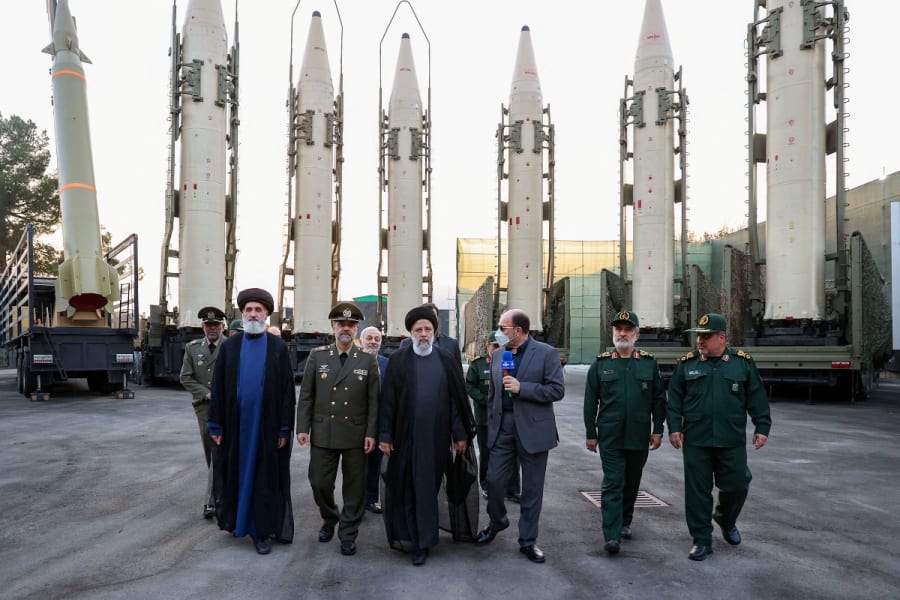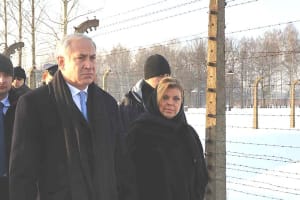How will the death of Iran's president impact Israel and the Middle East?
Raisi was seen as a probable successor to Supreme Leader Khamenei

On Monday morning, the Iranian regime confirmed that its President Ebrahim Raisi and Foreign Minister Hossein Amir-Abdollahian had died in a helicopter crash, on their way back from a visit in the neighboring country of Azerbaijan.
While Israel has denied its involvement in the crash that took place amid bad weather in a mountainous region, the death of two senior Iranian officials less than two months after Iran’s large-scale assault against Israel poses serious questions regarding the possible fallout for the Jewish state.
Raisi became president of the Islamic Republic of Iran in 2021, in elections widely seen as rigged, after a long and violent career in the regime’s judicial branch.
He was well-known as a hardliner and enthusiastic supporter of crackdowns against regime critics, earning the moniker “butcher/executioner of Tehran” for his involvement in the torture and murder of at least 1,500 – and possibly as many as 30,000 – regime opponents following the Iran-Iraq War in 1988.
Raisi never regretted his part in the massacre, calling it “divine punishment” and a “proud achievement” for the revolutionary regime. When he became Iran's attorney general (2014-2016), executions jumped compared to previous years, and during his time as judiciary chief (2019-2021), at least 1,500 peaceful protestors across 200 Iranian cities were imprisoned, tortured, and executed.
He was seen as a close confidant of Supreme Leader Ali Khamenei and supported his aggressive stance toward Israel, the United States, and the West in general.
Regarding his position toward Israel, former IDF Intelligence Chief Maj.-Gen. (res.) Tamir Hayman told The Jerusalem Post: “It would be hard to find someone worse.”
Nevertheless, it is important to note that the role of the president is only the second most important position in the regime’s hierarchy after the Supreme Leader, who controls all aspects of policy, especially the overall strategy of foreign and military affairs.
“The president of the Islamic Republic is an implementer, not a decision-maker,” Jason Brodsky, policy director at United Against Nuclear Iran, told The Times of Israel.
“So the policies of the Islamic Republic, the fundamentals of those policies, will remain the same.”
The president is usually more directly involved in interior and financial policy. It is in the internal arena that the deaths of Raisi and Amir-Abdollahian will weigh the heaviest.
The regime is already in an acute crisis of legitimacy, Raz Zimmt, a senior researcher at the Institute for National Security Studies (INSS), wrote on Ynet News.
Brutal crackdowns against dissenters, worsening economic conditions, and embarrassingly low voter turnout in recent parliamentary elections showed the “ongoing erosion of public trust ... and the intensity of desperation evident among large sections,” wrote Zimmt.
The deaths of two senior officials in an accident also make the regime look frail after already being humiliated by several security incidents in recent months.
In December, Pakistan struck targets in Iran with missiles and fighter jets, after Iran shot missiles at targets it said belonged to a Sunni terror group that had killed 11 Iranian policemen. The next month, some 84 people were killed in a terror attack by ISIS at a memorial for Quds Force commander Qassem Soleimani.
The most important consequence of Raisi’s death could be the impact on the election of the next Supreme Leader. Raisi was widely seen as a leading candidate to replace the 85-year-old Ali Khamenei and his death will now launch an internal power struggle.
“To have him off the field or incapacitated, dead, what have you, is a real shock for the politics of the system,” said Brodsky. It could “scramble the politics of succession,” he wrote on 𝕏.
The death of Foreign Minister Amir-Abdollahian is also expected to have a significant impact, as he was deeply involved in Iran’s recent strategic moves in the Middle East.
He led the successful reconciliation with Saudi Arabia and was seen as close to the IRGC’s Quds Force, meeting the leaders of Iran’s proxies several times since the outbreak of the war in Gaza.
Raisi also had deep connections to Iran’s armed proxies, especially Hezbollah, which publicly celebrated his victory in 2021. On the occasion, Hezbollah leader, Hassan Nasrallah, even called him “the hope of the Iranian people, the oppressed, and the resistance fighters.”
A few years earlier, Raisi toured southern Lebanon and the Israeli border, meeting Hezbollah leaders and visiting the family homes of popular terrorists Imad Mughniyeh and Mustafa Badr al-Din, both allegedly eliminated by Israel.
In conclusion, Raisi’s death will not bring about a sudden change in policy toward Israel, despite his being a sworn enemy of the Jewish state.
Instead, his death will further weaken the regime internally and take up much of its attention in power struggles, ultimately profiting Israel.
The long-term implications, however, are harder to predict, as the impact of Raisi’s demise on Supreme Leader Khamenei’s succession will remain unclear for the moment.

Hanan Lischinsky has a Master’s degree in Middle East & Israel studies from Heidelberg University in Germany, where he spent part of his childhood and youth. He finished High School in Jerusalem and served in the IDF’s Intelligence Corps. Hanan and his wife live near Jerusalem, and he joined ALL ISRAEL NEWS in August 2023.
You might also like to read this:














